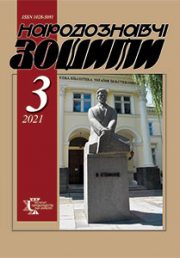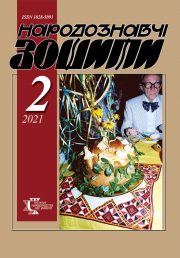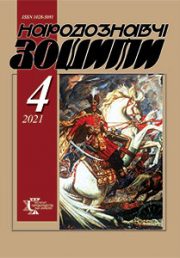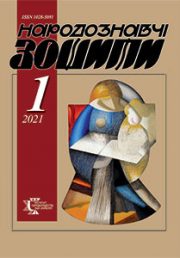The Ethnology Notebooks. 2020. № 3 (153), 519—531
UDK 37.091011.3:94-051
DOI https://doi.org/10.15407/nz2020.03.519
FOLK SONGS IN THE COLLECTIVE AND RESEARCH ACTIVITIES OF HRYHORII DEMIAN
KOVAL Halyna
ORCID ID: https://orcid.org/0000-0002-2998-2357
Candidate of Philological Sciences (PhD),
Senior Researcher at Folklore Department
at the Ethnology Institute
of the National Academy of Sciences of Ukraine
15, Svobody Avenue, 79000, Lviv, Ukraine,
Contacts: e-mail: galyna.kov@gmail.com
Abstract. In the article, the register of folk songs records and scientific works of H. Demian is made for the first time. The principles of the scientist regarding the observance of criteria of recording and publications are revealed. The research topic is relevant because of the factual material, especially in the functioning and traceability of the folklorization process, has become a priority for clarifying many questions of scientific analysis.
The purpose of the article is to present the song folklore in H. Demian’s recordings, to focus on terminology, genre-thematic classification. The object and source base of the study are folk songs recorded by the scientist in different years. As the historian, H. Demian was interested in songs of relevant topics, in particular, about O. Dovbush, about the assassination of tsar Kostiantyn, and about the First World War. Only a small number of works were published from the large array of folklore materials. Almost one third of the collection «From the Carpathian Mountains», which appeared in 1981, is recorded by him (63 items). The collector’s folklore interests included the children’s themes. They has been published in a volume «Children’s Folklore: Lullabies and Nursery Rhymes».
Folklore studies take an important part in H. Demian’s scientific activity. He is one of the first in the recent history of Ukraine to raise the issue of reflecting the events of the Carpathian Ukraine in 1938—1939 in folklore, since up until then it was impossible to do so for political reasons. He also actively recorded the songs of the riflemen, which are stored in the archive of the Institute of Ethnology of the NAS of Ukraine. The fixations date from 1977 to the early 1990s.
The most important part in the work of the researcher was the insurgent folklore, which reveals important themes of the creation of statehood, reproduces pictures of military life, feats, and victimhood of Ukrainian patriots. H. Demian professionally researched the theoretical problems associated with the historical basis of insurgent song folklore. Folklore studies of the insurgent songs by H. Demian are a certain scientific-theoretical system that provides a basis for researchers of socio-political thought.
Keywords: folk songs, songs of the riflemen, insurgent songs, motives, genres.
Received 19.05.2020
REFERENCES
Demian, H. (1980). Boykivshchyna (Vol. 3). Materials of a scientific expedition of 1979 to the area of construction of a reservoir on the river Stryi. Folk Songs (Part 1). In Department of Manuscripts of Lviv National Scientific Library V. Stefanik. F. 207. Od. save 20 [in Ukrainian].
Mishanich, S. (1981). From the Carpathian Mountains. Ukrainian folk songs are ballads. Uzhgorod: Carpathians [in Ukrainian].
Day, O. (1987). Ballads: Love and premarital relationships (P. 230—231, 250—251). Kyiv: Naukova Dumka [in Ukrainian].
Day, O. (1988). Ballads: Family-to-household relationships (P. 389—390). Kyiv: Naukova Dumka [in Ukrainian].
Pavlyuk, S., & Sokil, V. (2009). A word about Mother. In Folk songs from the voice of Paraska Pavlyuk (P. 14). Lviv [in Ukrainian].
Sokil, V. (2016). Volosianka in folklore and dialect (Pp. 26—38). Lviv [in Ukrainian].
Dovzhenok, G. (1984). Children’s Folklore: Lullabies and Fun. Kyiv: Naukova Dumka [in Ukrainian].
Dovzhenok, G. (1991). Children’s songs and recitatives. Kyiv: Naukova Dumka [in Ukrainian].
Demian, G. Spring-summer poetry and ritual of fights. Gather. In Archive of the Institute of Ethnology of NAS of Ukraine. F. 1. Op. 2. Unit. st. 299 [in Ukrainian].
Records of G. Demian’s shooting songs. In Archive of the Institute of Ethnology of NAS of Ukraine. F. 1. Op. 2. Unit. st. 381[in Ukrainian].
Demian, G. (1992). Twenty-five rebel songs. Ukraine in the past (Issue 3, pp. 10—42). Kyiv; Lviv [in Ukrainian].
Sokil, V. (2003). Folk songs from Ivan Franko’s homeland. Gather. Lviv: Stonecutter [in Ukrainian].
Demyan, G. (1989). Folk songs from Boykivschyna. Organizer, Dictionary and Note. Lviv [in Ukrainian].
Koval-Fuchilo, I. (2012). Howls (Pp. 537—542; 727—731). Kyiv [in Ukrainian].
Demian, G. (1991, 24—25 January). People about the Carpathian Ukraine from 1938 to 1939. Folklore in the spiritual life of the Ukrainian people: Regional scientific readings (Pp. 87—89). Lviv [in Ukrainian].
Demian, G. (Ed.). (1995). Self-motivated motives in rebel songs. Chronicle of red viburnum, 4—6, 22—25 [in Ukrainian].
Demian, G. (Ed.). (1993). The General Concept of Ethnic Studies in Ukrainian Abroad. Folk Art and ethnography, 2, 24—29 [in Ukrainian].
Demian, G. (1996). New Sources on Prashiv-Galician Analogies in Ukrainian Folklore (According to the 1992 expedition). Art and Traditional Culture of Ukrainian Abroad. Proceedings of the International Scientific Conference (Ivano-Frankivsk, November 10—12, 1992). Lviv [in Ukrainian].
Demian, G. (1995). Publishing of Ukrainian rebel songs and the first attempts to interpret them. Materials on Ukrainian Ethnology (Issue 1, pp. 308—320). Kyiv [in Ukrainian].
Demian, G. (1995). Insurgent struggle between the OUN and the UPA against the Nazis in song folklore of Ukrainians. Liberation path, 9, 1123—1133 [in Ukrainian]
Demian, G. (1996). Stepan Bandera in Ukrainian song folklore. Will and Motherland, 4, 94—99 [in Ukrainian].
Demian, G. (1997, 17 july). The Ukrainian people about General Roman Shukhevych — Taras Chuprinka. The way to win (Part 29—30, pp. 2255—2256) [in Ukrainian].
Demian, G. (2001). Prison Political Songs of Ukrainians. Notes by NTSH (Vol. 242, pp. 365—414). Lviv [in Ukrainian].
Demian, G. (2003). Vyselensky songs of Ukrainians. Liberation path (Book 2, pp. 59—70 [in Ukrainian].
Demian, G. (2002). Christian Topics in Rebel Songs. Liberation path (Book 5, pp. 38—48; book 6, pp. 45—55) [in Ukrainian].
Demian, G. (2003). Ukrainian Insurgent Songs of the 1940s—2000s (historical and folklore study). Lviv: Galician Publishing Union; Kyiv: Ukrainian Publishing Union [in Ukrainian].
Lunio, E. (2003). Fundamental study of rebel songs. Liberation path (Book 6, p. 120) [in Ukrainian].
Demian, G. (2005). Rebel Songs as a Historical Source. The Muse and the Sword: A National Movement in Folklore and Literary Sources. Collection of scientific works (Pp. 130—148). Lviv [in Ukrainian].
Demian, G. (2004). Ukrainian folkloristics in Galicia at the end of the 18th — beginning of the 19th centuries. Lviv [in Ukrainian].
Sokil, G. (2004). A significant contribution to the history of Ukrainian folklore. Liberation path (Book 8, p. 116) [in Ukrainian].







